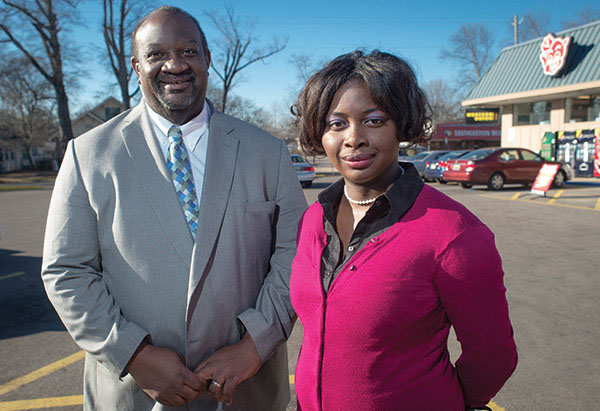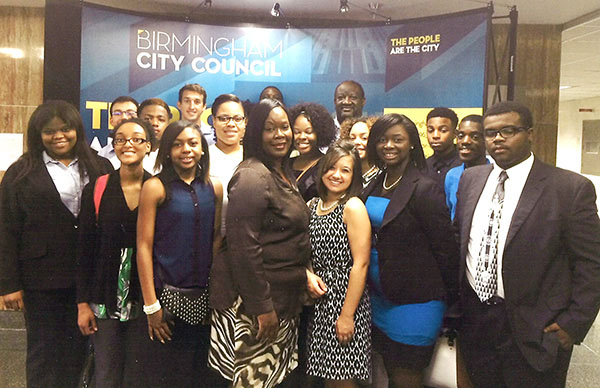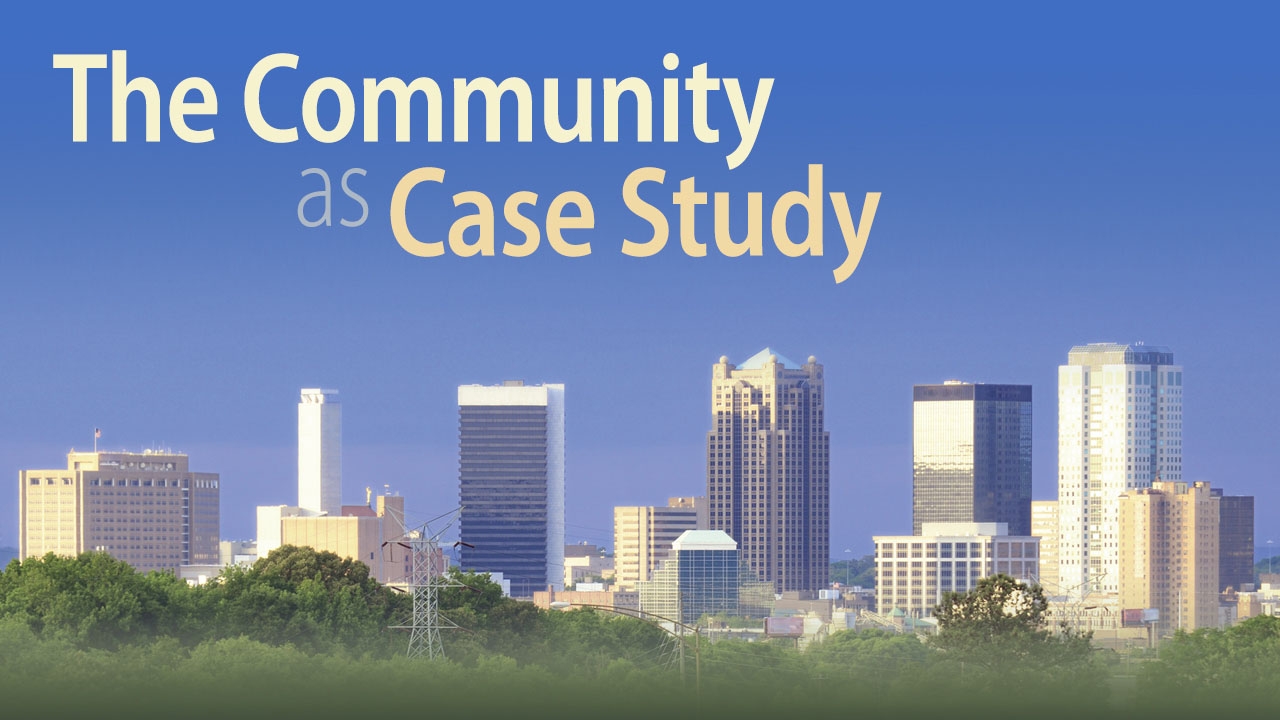Birmingham’s leaders have been listening to 22-year-old Ariel Smith’s advice for improving quality of life in the city’s neighborhoods. And the UAB student hasn’t even finished her senior year.
 Birmingham city leaders may act on ideas generated by business scholars including Ariel Smith (right). Nathan Oliver (left) led the team. Photo by Steve Wood.
Birmingham city leaders may act on ideas generated by business scholars including Ariel Smith (right). Nathan Oliver (left) led the team. Photo by Steve Wood.Smith was one of six students who took part in the UAB Collat School of Business Student Scholars Program, a two-week service-learning course that lets business students apply their classroom knowledge to help communities solve real-world problems from crime to poor housing and a lagging local economy. The scholars teamed up with nine high school students living in the community.
Last summer, the group analyzed housing, crime, business, education, health, culture, and recreation and entertainment in Birmingham’s Sixth District and developed a business plan for the area. The district, which borders UAB’s campus, includes the Glen Iris, Arlington-West End, and Woodland Park neighborhoods, among others.
“We’re looking at critical areas where we can give strategies for improvement,” says UAB business instructor Nathan Oliver, M.B.A., who led the project. “We canvassed the area and talked with people such as religious leaders, residents, teachers, and principals. We also canvassed local businesses.”
Adjusting the Wheel
Smith, a management major with a concentration in human resource management, heard about the Business Student Scholars Program after the group developed a marketing plan to attract new industries to Wilcox County, one of Alabama’s poorest counties, in 2011 and 2012. The scholars also researched the feasibility of having local farmers plant and sell bamboo, a resource used to make furniture, flooring, and other products. After Smith joined the program in 2013, the group studied the impact of the civil rights movement on Birmingham’s business community since 1963.
To prepare for the new project, the students learned how to research demographic and statistical data at UAB’s Sterne Library, Oliver says. The scholars used different business techniques such as a SWOT analysis to examine the Sixth District’s existing strengths, weaknesses, opportunities, and threats. They also developed comparative profile matrices to evaluate Birmingham and similar cities and set benchmarks.
“That’s essential in business,” says Smith, a Birmingham native. “We implemented it to show people that a lot of the issues in the Sixth District are not unique to it, and that you don’t have to re-create the wheel. You just have to adjust it.”
The course also featured guest speakers, including Mayor William Bell, Councilwoman Shelia Tyson, the Birmingham City Schools superintendent, and representatives from the Birmingham Police Department. Meeting city leaders benefited not only the UAB business students, but also the high school students, including four who live in the Sixth District, Smith says. “We taught them that their opinions matter,” she says. “We took them to the City Council meetings, and they introduced themselves one by one. It means a lot when someone says, ‘I want to hear what you have to say.’”
 The business scholars presented their proposals to Birmingham City Councilwoman Shelia Tyson (center) and other city leaders. UAB students working on this project included Ariel Smith, Andrew Clifton, Mia Dillard, Zachary Walker, Brechey White, and Halli Williamson; local high school students included Christina Ball, Darian Bester, Kiana Gibson-Ortiz, Roshundra Harris, Trey Hawkins, Darius Jackson, Terrance Johnson, Jessica Murphy, and Chre'stian Stinson.
The business scholars presented their proposals to Birmingham City Councilwoman Shelia Tyson (center) and other city leaders. UAB students working on this project included Ariel Smith, Andrew Clifton, Mia Dillard, Zachary Walker, Brechey White, and Halli Williamson; local high school students included Christina Ball, Darian Bester, Kiana Gibson-Ortiz, Roshundra Harris, Trey Hawkins, Darius Jackson, Terrance Johnson, Jessica Murphy, and Chre'stian Stinson.Proposals for Progress
The students have presented their creative solutions for the Sixth District to city leaders, who are interested in implementing them, Oliver says. One proposal in their business plan would identify neighborhood churches with programs such as free parenting classes and basketball leagues that could benefit district residents.
“One of the most important suggestions encourages Birmingham police officers to make themselves more visible to younger children in the communities as a way to build rapport early,” Oliver says.
The students suggested that local businesses should do more to highlight and celebrate high school sports teams by displaying team banners and photos in stores. They also advised businesses to collaborate on special discounts for area shoppers as an incentive to buy locally.
“This program has taught me to not only break the mold, but also to question why there’s a mold in the first place,” Smith says. “That’s all about innovation. Innovation doesn’t neglect what we have, but it also wonders what else can be.”
• Learn about the academic programs offered by the UAB Collat School of Business.
• Give something and change everything for students pursuing careers in business.


